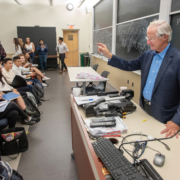Demand a Supply of Common Sense; Just Don’t Price It
by Brian Czech
“Natural resources originate from the mind, not from the ground, and therefore are not depletable.” Robert Bradley, President, Institute for Energy Research.
Ah, the confusion of economics students when they encounter the subject of supply and demand in introductory “micro.” They learn that prices are determined by supply and demand. Then they’re taught that the quantities supplied and demanded are determined by… prices!
There happens to be no lurking inconsistency here, no magic trick to dazzle us; not even a ridiculous fallacy to accuse the professor of. It’s just a matter of semantics; supply is not the same as “quantity supplied” and demand is not the same as “quantity demanded.” But these semantics do open the door for shenanigans!
The supply (per se) of raw diamonds, for example, is determined primarily by how many diamonds are in the ground and the technology available for mining them. Supply clearly does influence price; diamonds are expensive partly because they are so hard to find and extract. On the other hand, the “quantity supplied” is what is brought to the market by diamond sellers. Price clearly does influence the quantity supplied; the higher the price, the higher the quantity supplied.
So the relationships among supply, price, and quantity supplied are really not so mysterious, at least not until a linguistically reckless or unscrupulous growthman wades in to muddy up the waters. As an example, the late Julian Simon comes to mind, but there are plenty of living counterparts. Robert Bradley, president of the Institute for Energy Research, believes that “Natural resources originate from the mind, not from the ground, and therefore are not depletable. Thus, energy can be best understood as a bottomless pyramid of increasing substitutability and supply.” In other words, innovators supply the world with natural resources, including energy, from their minds. Therefore, the supply of such resources is no problem.
Clearly such a theory induces a healthy supply of corrupt political dialog, in which the word “supply” is, well, over-supplied. I may as well partake!
Consider the number of smokers in a room and the amount of smoke they supply. When we crowd more smokers into the room, we get higher supplies of smoke. As the smoke supply increases, however, non-smokers start to leave. Eventually even the smokers leave, beginning with the lighter smokers who don’t like heavy smoke. So at first, more smokers means a higher supply of smoke, yet eventually a higher supply of smoke means less smokers. In a goofy sort of way, with a touch of linguistic liberty-taking, more smokers means less smokers and cleaner air. (Some of the ex-smokers may have taken up plug tobacco, however, increasing the spittle supply on the sidewalk.) This can be twisted into an insinuation, self-deception, or bald-faced lie that smoking is a self-correcting problem, and that the key to less smoking in society is more smoking!
This ludicrous example mirrors the claim that the invisible hand of the market will “fix” any resource shortages that might arise, which is based on the assumption that increasing price will increase not only the “quantity supplied” but the bona fide supply. After all, supplies come from the mind. It’s smoke-and-mirrors, so to speak.
We’ve all been downwind of cigarette smoke. (Hopefully, few of us have been downstream of plug spittle!) Certainly we have the right to poke a little fun, especially at Big Tobacco’s “Seven Dwarves,” who perjured before a U.S. House of Representatives Subcommittee, “I believe that nicotine is not addictive.” The resulting news broadcast was unforgettable to many Americans, who learned a lot about Big Money that day. We fully expected the Seven Dwarves to announce, as an encore, the Tooth Fairy’s engagement to Santa Claus.
So Americans know quite well how Big Money can pollute the truth. Can we expect the mother of all money-making theories, unlimited growth theory – along with its crazy correlates – to come to us on wings of truth? Sure, sure, higher prices stemming from lowered supplies actually “increase” supplies because they provide an incentive to “supply” even more. And more smoke makes the air “cleaner” by providing an incentive for smokers to increase the “supply” of clean air. More traffic increases the “supply” of open road. More noise actually leads to a greater “supply” of quietness. Less of a good thing leads to more of it! More of a bad thing leads to less of it! Or, if you prefer, less of a good thing leads to less of a bad thing, and more of a bad thing leads to more of a good thing!
So if the growthmen want to claim that oil supplies, for example, are actually increasing, not decreasing, as evidenced by a downturn in price, let them play with the word “supply” like the Seven Dwarves play with “addictive!” Let them use “supply” to mean more, less, an OK mess, anybody’s guess … whatever. But may the rest of us not sound, as one old hand used to say, “Dummer’n a doggone boot!” Supply is how much there is, after all, and as you use it, less remains.
Diamond ring: $5,000.00. Neoclassical economics textbook: $100.00. Common sense: priceless.





Amen. And let’s not forget unemployment. According to the growth orthodoxy, unemployment creates jobs. How does this happen? Easy! Unemployed workers are willing to work for less money, which drives down the cost of labor. The lower cost of labor creates an incentive for investors to hire people to produce more goods and services (at a lower price). All the newly employed unemployed people can then go out and buy the cheaper goods and services with their lower wages. That is unless there is unemployment insurance to keep people from supplying their labor at a lower cost. And if you don’t swallow that crock of bull, you’re committing the “fallacy” of assuming there is “only a fixed amount of work to be done.”
So remember, folks, unemployment creates jobs… and more smoke makes the air cleaner.
And here in the UK we are being told that ‘progressive austerity’ means that ‘we are all in it together’.
It’s just that the poor are getting a lot more of ‘it’ than the financial warriors who got us into this mess.
However,the free market will come to the rescue by growing the economy and producing more profits which will trickle down to those at the bottom.
No need for the state to protect the poor and control the market.
We are also told that more people will lead to more problem solvers, geniuses, technological miracles :population growth will therefore solve all problems because more is good.
(Not so good for tigers,dolphins,whales,turtles,bumble bees, honey bees, lapwings,reptiles,water supplies,soil quality,forests,air quality,climate stability.)
The twisted logic employed by advocates of continuous growth economics ad infinitum, and alluded to in this wonderful article remind me of those who posit that one solution to population overshoot would be to increase consumption of natural resources to raise standards of living, thus attaining diminished or zero growth as currently displayed in nations with high living standards. Fallacies abound. :-P
Perfect example of disconnection from reality. Quite common, I would say, and by no means unique to the business/economics world. Many of us, including probably myself, don’t realize how thin is the infrastructural layer, provided by technology, that “insulates” us from the natural world, which is regulated by inflexible laws indifferent to our beliefs or opinions. We are used to consider so obvious the supply of basic things (food, energy) that we give it for granted. Of course it is not. There are many examples of people who starved to death just a few miles into the wilderness. Some old people in Europe still remember how dramatically fast the food can desappear in war time. Of course, when influential people, such as renowned economists or politicians, are so disconnected, they can do much more harm than ordinary people.
The fundamental problem in economics is scarcity. Because of this, resources need to be allocated as efficiently and equitably as possible.
That said, economics doesn’t claim there is an infinite supply of resources, but rather it asserts that there is no limit to man’s inventiveness and innovativeness, which would enable resources to produce more. One good example is the Green Revolution.
While the Green Revolution may have addressed the scarcity of food issue, there are well-meaning arguments (and evidence) that it did produce adverse environmental and health impacts – an unintended consequence of a ‘policy’ intended to meet a global common good.
Of course, differences in opinion abound. Depending on where you are in the ideological spectrum (often based on specific backgrounds and biases), things can be miscontructed quite easily especially if parlayed by the uninitiated.
While the Green Revolution may have addressed the scarcity of food issue, there are well-meaning arguments (and evidence) that it did produce adverse environmental and health impacts – an unintended consequence of a ‘policy’ intended to meet a global common good.
Global common good? Is that a code word for profit? Or is this my ideologically-driven confirmation bias speaking?